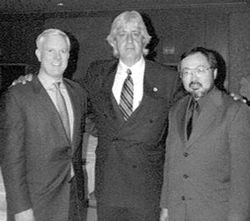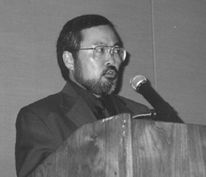 |
||
|
Vol. 31, No. 1
|
"Many Languages.....One Voice"
|
Fall, 2000
|
CCIA Members Appointed to JCIAP

On November 18, three more CCIA members accepted their appointment to the Court Interpreters Advisory Panel. The 22-member panel consists of 11 court interpreters, 5 judges, 4 court administrators and 3 attorneys.
Fuzzy math? No, it just happens that one of the new appointees, Kaoru Tamura, is a lawyer as well as an interpreter. Although she is licensed to practice law in California, Ms. Tamura was inspired by an article Judge Ito had written for a local Japanese-language newspaper to seek work as an interpreter in the Los Angeles
courts. She enjoys the unpredictability of criminal courts and the opportunity of meeting interpreters and other people from widely-differing cultures and traditions.
Anyone who heard Donal Donnelly speak at the annual conference in October will not be surprised to learn that he has also agreed to serve on this panel. The speech Judge Donnelly delivered in San Francisco clearly demonstrated both the depth of his commitment to bringing justice to the California courts and his sensitivity to the complexities of the interpreter's role in this process. To paraphrase the Neruda poem quoted during his speech, this Imperial County judge will not be found “only among books,
but with women and men.”
Lourdes Campbell, in her various roles as vice-president and continuing-education director for CCIA, has been such a regular contributor to this newsletter that she needs little further introduction to its readers. Her energy and intelligence, coupled with the insight gained by many years of interpreting in every conceivable venue, will serve the panel well.
Although these three people bring very different backgrounds to the panel, they are alike in their willingness to volunteer their time and efforts to the common goal of ensuring equal access to justice for all who come into its courts. Those of us who have attended the quarterly meetings of this panel, which are open to the public, have found them to be both fascinating and educational. The thoughtfulness and dedication of all our interpreter colleagues, as well as that of the other members, should be an inspiration to the rest of us to find time to make our own contributions to this profession.
President’s Message
by Carlos Cerecedo
I wish to thank you for electing me as your president for two more years.
During this challenging period, I hope to face the issues with the clear mind and flexible attitude that will be required to steer the profession towards a good educational and financial future, coupled with better working conditions for both independent contractors and employees.
I’d also like to take this opportunity to congratulate all those members involved in the annual conference in San Francisco. The results were beyond all expectations; both the presenters and the conference itself received outstanding reviews overall. Thanks once again to Lourdes and the other CCIA volunteers who worked so hard to make this conference such a success.

We were honored by the visits of Chief Justice Ronald George, AOC director, William Vickrey and Judge Lance Ito. Joseph Wong and several other staff members from the interpreters’ program were also in attendance. The presence of these distinguished guests tells us that CCIA is looked upon as a strong organization with a tradition of service to the interpreting community and a dynamic vision of its future.
During the conference, it was announced that the four-year degree program at Cal State Long Beach is well underway. Cal State now has the names of the first 26 high school students who will be enrolled in this new program in the fall of 2001. We have also made dramatic progress towards our goal of implementing a course to educate law students on working with interpreters. The Santa Barbara College of Law has sent me a letter confirming that, beginning next summer, they will be offering a 30-hour course dealing with language in the courtroom and interpreter issues.
Looking ahead, it is clear that the independent contractor vs. employee issues will pick up steam over the next few months. If the Judicial Council comes up with a ‘sample’ contract for the counties, the challenge for us will be to figure out how to negotiate our individual contracts as independent contractors and how to ensure fair treatment for those who may choose to become employees. There will also be a question as to which, if any, union will represent them.
Also on the agenda is a plan to request from the Judicial Council that some sort of grievance procedure be developed. It is of the utmost importance to all of us that steps be taken to avoid having “unpleasant interpreters” phased our of the work force without fair hearings or due process.

These are exciting times for interpreters; over the past several years, there have been great improvements in our compensation, our working conditions and our educational opportunities. But let me emphasize once again that this progress has been largely fueled by the volunteer efforts of our hard-working colleagues. The only way for our community to continue moving ahead is through the participation of as many members as possible. Therefore, I urge you once again to step forward and
get involved in the life of your organization; we all need your support.
Personal Comments from a Retired CCIA President
by Renée Veale

During my years as CCIA president and LACC chairperson, I grew tired of continually fighting old battles and correcting half-truths and misinformation. Nevertheless, I am very proud of our past accomplishments. I am hopeful and confident in the direction that CCIA has been going and in its present leadership.
You would have felt that pride, too, by the respect shown to our profession and Association by the Chief Justice of California, Ronald M. George and the Administrative Director of the Courts, William Vickrey, in their remarks at our recent conference in San Francisco, when they both said that California’s court interpreters deserve more money and should be at parity with federal court interpeters.
I would like, however, to set the record straight regarding those organizations and/or individuals who would take such credit for the raises we received. Whenever I hear them make such claims I yearn to ask, “How did you do that all by yourself?”
It is my considered opinion that the process leading to the present per-diem raises really started on January 12, 1998, when the three associations CCIA, BACI and CFI met with Mr. William Vickrey and his staff. Several very important topics of concern to all parties were discussed, including the use of non-certified interpreters, the need to increase the number of certified interpreters and of course, the issue of remuneration. I personally provided a list which brought to their attention the extreme disparity in per-diem rates that existed at the time among the 58 California counties. These statistics came as a surprise to the AOC.
In that meeting and in subsequent contacts, it became apparent that in order to attract more qualified people into the profession and to retain those already certified, compensation had to made more attractive and competitive. The AOC wisely recognized that the old law of “supply and demand” worked heavily in favor of interpreters.
We, through continuing open contact with the AOC, pointed out that there were not that many qualified interpreter candidates in the State of California and those who were—or could be—qualified might very well choose other professions, instead of going to the trouble and expense of preparing for the certification exams. We also pointed out that good interpreters could make more money in the private sector. This is the reason we obtained both statewide parity and the per-diem increases.
Further proof of the AOC’s, i.e., the Judicial Council’s interest in increasing the number of certified interpreters, is the recent development and presentation of two-day workshops for those who passed the written certification exam but failed the oral portion. These workshops represent a significant effort and financial commitment on their part.
Judge Ito Departs JCIAP

On November 18th, Judge Lance Ito chaired his last meeting as head of the Court Interpreters Advisory Panel. He had served in that capacity since the panel was formed in 1993, in response to legislation authorizing the Judicial Council to adopt standards of professional conduct, establish requirements for certification, regulate continuing education and certification renewal and adopt programs to recruit and train additional interpreters.
Since the over-arching goal of the Judicial Council is to provide equal access to justice for non-English speakers throughout the state, the first fruits of the panel’s efforts were the adoption, in 1994, of continuing education and certification renewal requirements. These requirements, along with ethics workshops, were designed to ensure that judiciary interpreters maintain and improve the skills necessary to meet the demands of their profession.
Judge Ito has often stated that he would not leave the advisory panel until the per-diem compensation for judiciary interpreters had reached $250. Just three years ago, in 1998, the rates paid in the state’s 58 counties varied from a low of $114 to a high of $210. As of July 1st of this year, per-diem compensation for certified and registered contract interpreters had risen to $265, which represented the third pay increase since 1999. A request to increase compensation yet again- this time to $285-in July of 2001 is before the Legislature. The eventual goal, as expressed by both Judge Ito and AOC chief, William Vickrey, is to equal the $305 that federally certified court interpreters currently receive.
Under Judge Ito’s leadership, three seats on the advisory panel have been designated for representatives from CCIA, BACI and CFI. These colleagues, along with the other interpreters on the panel, are there to articulate their common concerns over issues affecting our professional lives and work with the rest of the panel and the council to improve access to the courts.
Over the past several years, in addition to running the JCIAP, Judge Lance Ito has been actively involved in improving communication between interpreters and the judiciary. He has taught courses at the New Judges’ College to educate newly-appointed judges about the role of interpreters and effective ways of working with them in court. In the fall of 1999, The Polyglot published a draft bench guide he wrote for the use of the Los Angeles Superior Court in cases involving interpreters. The guide cites the code section mandating the use of certified interpreters and outlines the procedure to be followed to provisionally qualify those who are non-certified if no certified interpreter is available.
The result of Judge Ito’s efforts over the last seven years has been to greatly increase the courts’ awareness and understanding of the demanding and complex role that interpreters play in the judicial process. As one of the panel members, Mark Arnold, observed at the November 18th meeting, Judge Ito deserves a lot of credit for taking interpreters from being considered mere functionaries to their present positions as well-respected professionals.
FEES & WORKING CONDITIONS
DO YOU WANT TO BE AN EMPLOYEE?
CCIA's members have, for the most part, indicated they wish to retain their independent contractor status, while affirming that those who would like to become employees should have the option of doing so. The other organizations, by contrast, have established a goal of making all interpreters employees through legislation, with their own union.
The strategy of the other organizations was dependent upon the assumption that court employees would become state employees, so that all interpreters could be grafted onto this new system, and choose their own union. To see if this was feasible, CCIA officers kept abreast of the activities of the Judicial Council's Task Force on Trial Court Employees, which was charged with preparing recommendations for a new court employee personnel system. The results of the Task Force's efforts were vitally important to any decision the CCIA Board would make regarding the employee issue. The final report was issued in December, 1999. Its recommendations were drafted into Senate Bill 2140, which has passed and goes into effect January 1, 2001.
As reported in the Summer, 2000 issue of The Polyglot, this new legislation provides that persons hired to work in the courts will not become state employees. Instead, they will be classified as court employees of the local county courts, which will have sole authority to hire, fire and supervise them. Also, as things currently stand, any interpreters employed by the courts will belong to the same union as the other court employees do.
So what is to become of the hopes of some to become state employees and bring in their own union? In light of the newly-legislated provisions of SB 2140, the old plan won't work. However, CCIA members have been hearing about another plan to propose legislation making all interpreters state employees—as employees of the AOC. What do you think? Can the AOC realistically supervise and coordinate us, which it would have to do as our employer? Do you think it likely that the legislature will pass a bill forcing the highest judicial administration of the state to hire anyone it doesn't want to? And, into the bargain, require that these new employees receive benefits and perks they may not be able to give?
And what about interpreters who are content with their independent status, who would lose a lot of their autonomy? Or who make more money being independent than they could as employees? Is that just "too bad?" Or necessary collateral damage in pursuit of what is supposedly best for the profession as a whole?
So what can we do?
CCIA is currently determining which counties are willing to create employee positions. Some are interested in hiring full-time employees to work an 8-5 day. It is possible staffers may get some flexibility, especially if other courtroom personnel have left, but that cannot be guaranteed. The counties' main complaint to the AOC is that cases come up after interpreters have left. Actually, one of the main reasons courts want staffers is to cover any contingency that could arise during the day. Courts say that if they can't hire employee interpreters who will be available whenever they are needed, what's the point of hiring full-time interpreters at all? Even one of the other interpreter organizations is now saying they can't guarantee flexible schedules if all of us were to become employees, although this was a perk they had advertised to prospective union members.
We will have to see what develops, but at the annual conference in October, AOC director William Vickrey stated that, in addition to obtaining more raises for interpreters, the AOC wants to see what it can do to help interpreters desiring employee status.
In any case, time will tell. Meanwhile, CCIA will continue to work with interpreters to help them achieve the job status they desire, under mutually acceptable working conditions that have been equitably negotiated.
The Latest on Language Line
Alarms have gone off in our profession recently with the revelation that the Judicial Council has held some workshops for telephonic interpreters, thus seeming to legitimize this practice. Demonstrations were also put on by both Language Line and, even more ominously, by a representative of VoxOlom telephonic simultaneous interpretation equipment at the June 25th JCIAP meeting. With regard to the latter, one couldn't help but be impressed. CCIA has expressed its position on telephone/video conference interpreting on more than one occasion in The Polyglot and at JCIAP meetings. We have also expressed our views and possible solutions privately to the AOC.
The upshot is that, though some of us might like to, we will not succeed in eliminating this service, especially in isolated rural areas and for cases needing an exotic language interpreter. Some situations literally boil down to the court's choosing Language Line or dismissing the case. The choice is obvious.
Nevertheless, the time has come to set clear limits on how this new service and technology can be used. What action can we take? Some have suggested that we could force the courts to exclude Language Line altogether through a contract. Sounds interesting, but current law precludes that option. We will present to the Judicial Council a proposed Rule of Court regulating the use of telephonic interpretation. This is the most viable option at this time, since it would be applicable whether interpreters are employees or contractors. It will also leave the courts a way out to use such a service if they truly need to.
We will keep the membership informed of the results of our efforts.
AB 2589's (Welcome) Demise
Assembly Bill 2589, which would have obligated us to interpret in many out-of-court domestic violence proceedings and do special continuing education, has died a natural death. CCIA, the other organizations, and the Judicial Council opposed it. Meanwhile, the Judicial Council's representatives kept working behind the scenes to defeat it after it seemed like our efforts were going to be fruitless. But why did the bill finally fail? Appropriations: the legislature didn't want to spend the money.
So, we will not have to interpret in these other settings and take additional classes. The Judicial Council, however, has added domestic violence as a subject which will be accepted as continuing education. Taking such classes, however, will be entirely optional.
Orange County News
A panel of three CCIA members recently met with Orange County administration to try to iron out disagreements interpreters had with the proposed county contract.
Some proposed amendments were accepted by the county. The county had told the panel they were going to be requiring that everyone sign a contract to work, but apparently many are working without having signed the contract. In addition, a member of this panel was appointed by the county to be part of a task force charged with working to improve the efficiency of court administration.
A principal concern of the interpreters is the inefficient warrant system which frequently results in very late payment. CCIA representatives have tried to remedy this situation, with limited success. To show emotions run high over this issue, many interpreters recently staged a sit-in.
We have also just received word that an interpreter's "services were no longer needed," for no reason stated to him—although it is apparent the county is skittish because of the past lawsuit in Los Angeles and a recent lawsuit filed in Orange County by an interpreter.
With regard to all these problems, CCIA members are currently dealing with either the county or the Judicial Council to find workable solutions.
Contract Pays off in Santa Cruz
Recently, due to crossed wires and some unreasonable expectations, Santa Cruz court administration attempted to require that one interpreter stay until 5:00 p.m. every day, "no exceptions." Of course, this would be rotated, but there are only three interpreters who would rotate this chore. And quite often all interpreters have finished by 3:00 pm, at the latest. This small group of interpreters met, unanimously decided they would not comply with this unilateral demand, and marched in to meet with the court’s Executive Officer. The spokesman for the group pointed to relevant parts of their written contract that do not allow for such quasi-employee treatment.
The county backed down in its demands, and merely gave further admonishment to make sure departments are covered and cases don't fall through the cracks. This is a fine example of what can be achieved by unity of action, coupled with the protections afforded by having a written contract.
Interpreters Give Seminar for Judges in Santa Cruz
The interpreters of Santa Cruz recently put on a brown-bag workshop for judges, court administrators, family law facilitators and others. One interpreter acted as master of ceremonies, and four others each made presentations on the legal basis of our profession, linguistic issues, ethics and challenging interpreting situations. Afterward, there was a question and answer session. The workshop was very well received, and there were even requests for another one.
Everyone also expressed that they wish something like this had been done much sooner.
Those who put together this presentation encourage interpreters to do so in their respective counties, and are willing to give suggestions to help others put on their own workshops of this kind. Contact Denise Choate, whose phone number and e-mail appear on page two of each issue of The Polyglot. —Denise Choate